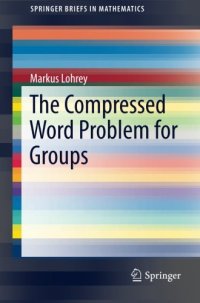
Ebook: The compressed word problem for groups
Author: Markus Lohrey (auth.)
- Tags: Group Theory and Generalizations, Topological Groups Lie Groups, Analysis
- Series: SpringerBriefs in mathematics
- Year: 2014
- Publisher: Springer-Verlag New York
- City: New York, NY
- Edition: 1
- Language: English
- pdf
The Compressed Word Problem for Groups provides a detailed exposition of known results on the compressed word problem, emphasizing efficient algorithms for the compressed word problem in various groups. The author presents the necessary background along with the most recent results on the compressed word problem to create a cohesive self-contained book accessible to computer scientists as well as mathematicians. Readers will quickly reach the frontier of current research which makes the book especially appealing for students looking for a currently active research topic at the intersection of group theory and computer science. The word problem introduced in 1910 by Max Dehn is one of the most important decision problems in group theory. For many groups, highly efficient algorithms for the word problem exist. In recent years, a new technique based on data compression for providing more efficient algorithms for word problems, has been developed, by representing long words over group generators in a compressed form using a straight-line program. Algorithmic techniques used for manipulating compressed words has shown that the compressed word problem can be solved in polynomial time for a large class of groups such as free groups, graph groups and nilpotent groups. These results have important implications for algorithmic questions related to automorphism groups.
The Compressed Word Problem for Groups provides a detailed exposition of known results on the compressed word problem, emphasizing efficient algorithms for the compressed word problem in various groups. The author presents the necessary background along with the most recent results on the compressed word problem to create a cohesive self-contained book accessible to computer scientists as well as mathematicians. Readers will quickly reach the frontier of current research which makes the book especially appealing for students looking for a currently active research topic at the intersection of group theory and computer science. The word problem introduced in 1910 by Max Dehn is one of the most important decision problems in group theory. For many groups, highly efficient algorithms for the word problem exist. In recent years, a new technique based on data compression for providing more efficient algorithms for word problems, has been developed, by representing long words over group generators in a compressed form using a straight-line program. Algorithmic techniques used for manipulating compressed words has shown that the compressed word problem can be solved in polynomial time for a large class of groups such as free groups, graph groups and nilpotent groups. These results have important implications for algorithmic questions related to automorphism groups